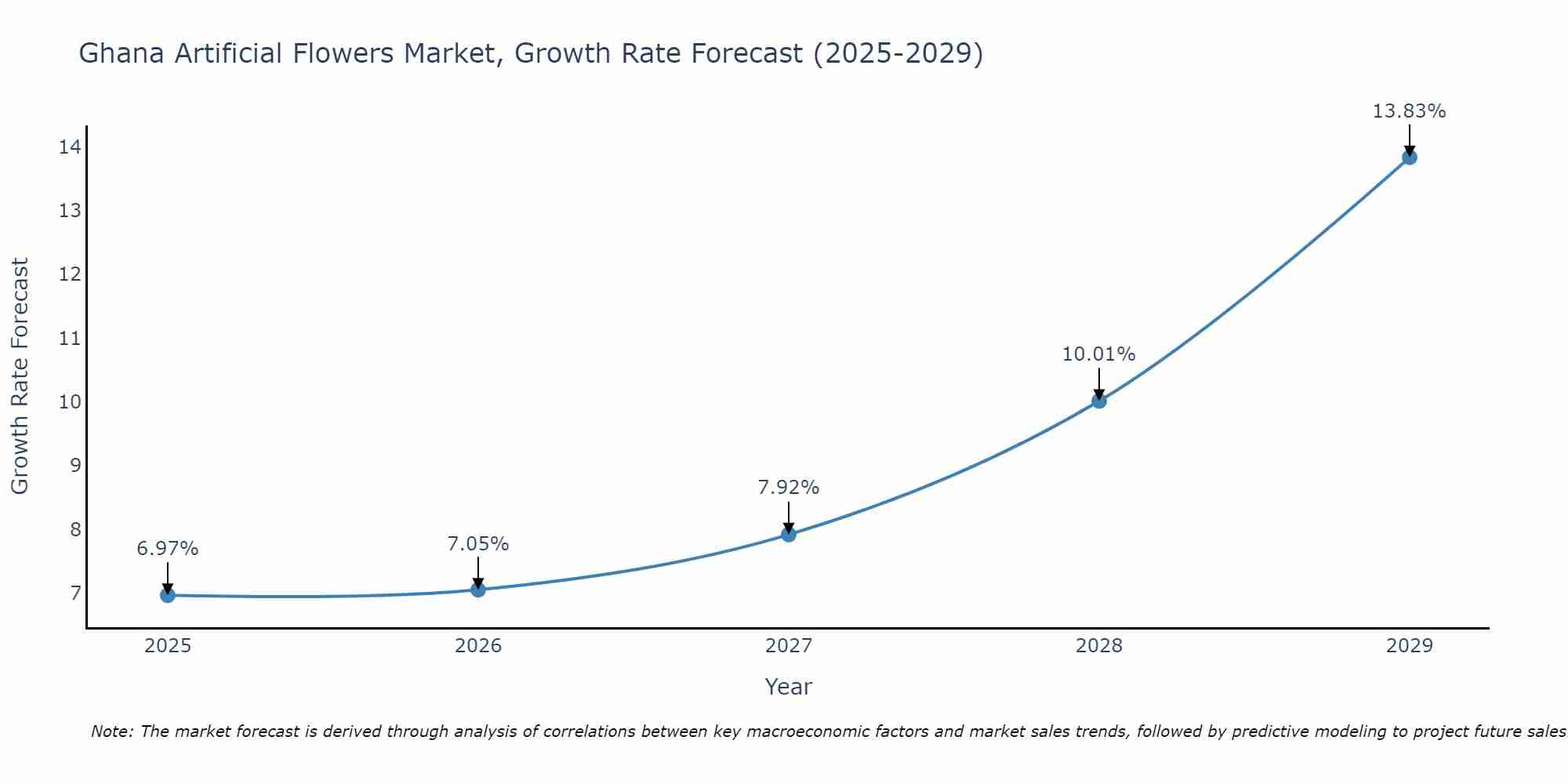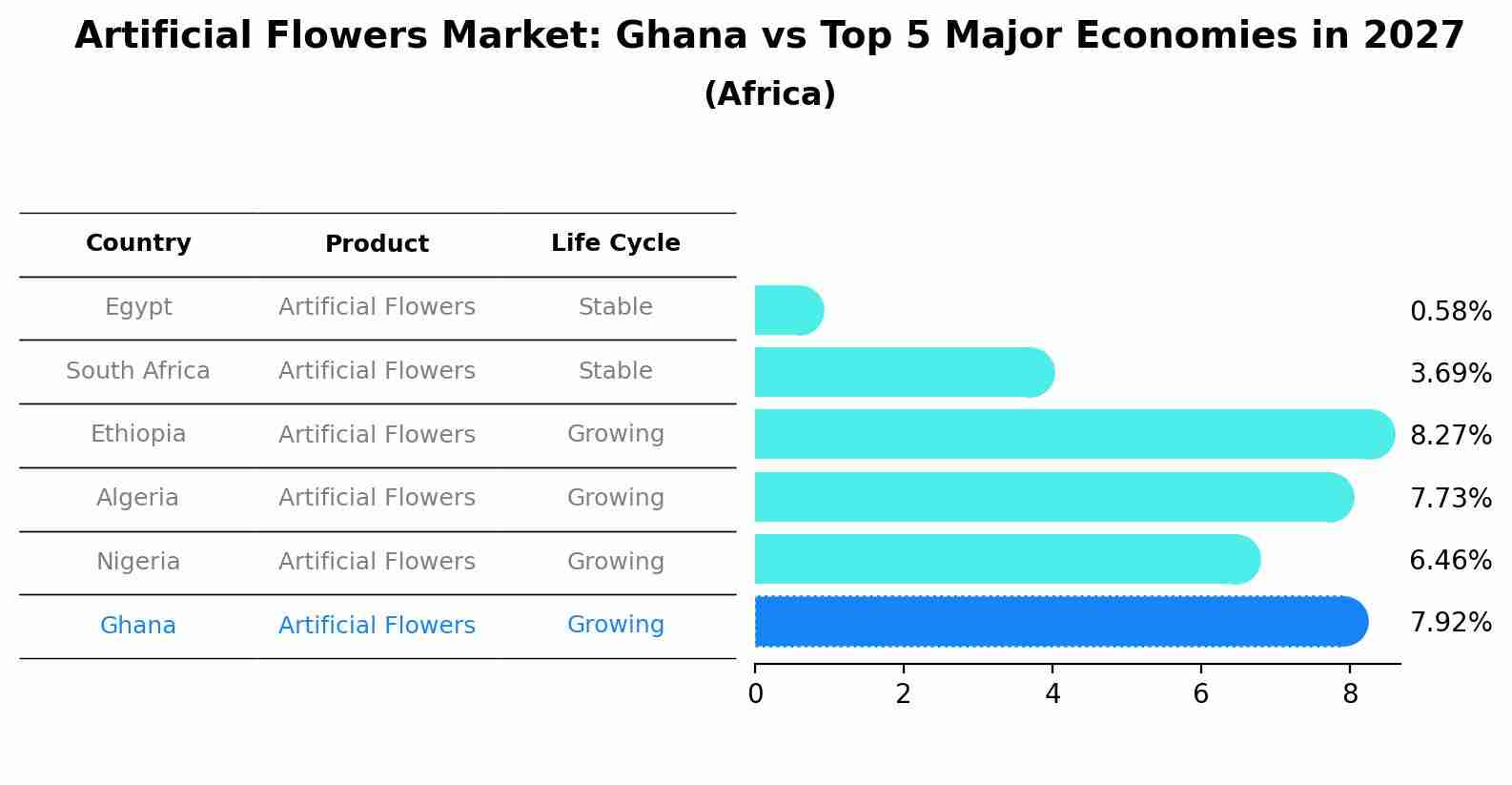Ghana Artificial Flowers Market (2025-2031) Outlook | Size, Revenue, Forecast, Companies, Growth, Industry, Trends, Value, Analysis & Share
| Product Code: ETC380216 | Publication Date: Aug 2022 | Updated Date: Jul 2025 | Product Type: Market Research Report | |
| Publisher: 6Wresearch | Author: Shubham Deep | No. of Pages: 75 | No. of Figures: 35 | No. of Tables: 20 |
Ghana Artificial Flowers Market Size Growth Rate
The Ghana Artificial Flowers Market is likely to experience consistent growth rate gains over the period 2025 to 2029. From 6.97% in 2025, the growth rate steadily ascends to 13.83% in 2029.

Artificial Flowers Market: Ghana vs Top 5 Major Economies in 2027 (Africa)
The Artificial Flowers market in Ghana is projected to grow at a growing growth rate of 7.92% by 2027, highlighting the country's increasing focus on advanced technologies within the Africa region, where Egypt holds the dominant position, followed closely by South Africa, Ethiopia, Algeria and Nigeria, shaping overall regional demand.

Ghana Artificial Flowers Market Synopsis
The Ghana Artificial Flowers Market is a growing sector within the country`s decorative products industry. With increasing urbanization and a rising middle-class population, there is a growing demand for artificial flowers as a cost-effective and low-maintenance alternative to fresh flowers. The market offers a wide range of artificial flowers in various designs, colors, and materials to cater to different consumer preferences. Key distribution channels for artificial flowers in Ghana include specialty stores, online retailers, and supermarkets. The market is also influenced by seasonal trends and cultural events, such as weddings and funerals, where artificial flowers are commonly used for decoration. Overall, the Ghana Artificial Flowers Market presents opportunities for both local and international manufacturers to capitalize on the growing demand for decorative products in the country.
Ghana Artificial Flowers Market Trends
The Ghana artificial flowers market is experiencing a growing trend towards more realistic and high-quality artificial flower products that closely mimic the appearance of fresh flowers. Consumers are increasingly seeking artificial flowers that are durable, lifelike, and suitable for long-term use in home decor, events, and gifting. Sustainability and eco-friendliness are also becoming important considerations, with a rising demand for artificial flowers made from recyclable materials. Additionally, there is a noticeable shift towards unique and customizable artificial flower arrangements, allowing customers to personalize their decor and express individual style preferences. Overall, the market is witnessing a move towards premium artificial flower products that offer longevity, aesthetic appeal, and environmental consciousness to meet the evolving preferences of Ghanaian consumers.
Ghana Artificial Flowers Market Challenges
In the Ghana Artificial Flowers Market, some challenges faced include the perception of artificial flowers as inferior to natural flowers, limited awareness and understanding of the benefits of artificial flowers, and the presence of low-quality, cheap imports flooding the market. Additionally, the high cost of quality artificial flowers compared to fresh flowers can deter some consumers. Lack of variety and innovation in design options also hinders market growth. Addressing these challenges would require educating consumers about the durability and cost-effectiveness of artificial flowers, enhancing product quality standards, and introducing a wider range of trendy designs to attract a broader customer base and increase market demand.
Ghana Artificial Flowers Market Investment Opportunities
Investment opportunities in the Ghana artificial flowers market include the potential for growth driven by increasing demand for artificial flowers in various applications such as home decor, events, and gifting. With the rising trend of incorporating artificial flowers in interior design and the convenience they offer in terms of maintenance and longevity, there is a growing market for high-quality, realistic artificial flowers. Investors could consider opportunities in manufacturing and supplying a diverse range of artificial flowers, targeting both retail and wholesale markets. Additionally, there is potential for innovation and differentiation through the use of sustainable materials, unique designs, and customization services to cater to evolving consumer preferences in Ghana`s artificial flowers market. Overall, investing in this sector could offer promising returns as the market continues to expand and diversify.
Jordan Agar Market Government Policies
The Ghanaian government does not have specific policies targeting the artificial flowers market. However, the general trade policies in Ghana, including import regulations, taxation, and business registration requirements, apply to businesses in the artificial flowers industry. The government`s focus on promoting the manufacturing sector through initiatives such as the One District, One Factory program could potentially benefit artificial flowers manufacturers in the country by providing support for local production. Additionally, efforts to improve infrastructure and transportation systems in Ghana may help facilitate the import and distribution of artificial flowers products. Overall, while there are no direct policies related to the artificial flowers market, broader government initiatives and trade regulations play a role in shaping the business environment for industry players in Ghana.
Ghana Artificial Flowers Market Future Outlook
The future outlook for the Ghana Artificial Flowers Market appears promising, driven by several factors. The increasing trend of using artificial flowers for home decor, events, and gifting purposes is expected to fuel market growth. Additionally, the rising disposable income levels and changing consumer preferences towards long-lasting and low-maintenance decor items are likely to contribute to the market expansion. The growing availability of a wide variety of artificial flowers in different designs, colors, and materials is also anticipated to attract more consumers. Furthermore, the increasing focus on sustainable and eco-friendly products may lead to the development of biodegradable artificial flowers in the market, catering to the environmentally conscious consumer segment. Overall, the Ghana Artificial Flowers Market is poised for growth in the coming years, offering opportunities for manufacturers, retailers, and suppliers in the industry.
Key Highlights of the Report:
- Ghana Artificial Flowers Market Outlook
- Market Size of Ghana Artificial Flowers Market, 2024
- Forecast of Ghana Artificial Flowers Market, 2031
- Historical Data and Forecast of Ghana Artificial Flowers Revenues & Volume for the Period 2021 - 2031
- Ghana Artificial Flowers Market Trend Evolution
- Ghana Artificial Flowers Market Drivers and Challenges
- Ghana Artificial Flowers Price Trends
- Ghana Artificial Flowers Porter's Five Forces
- Ghana Artificial Flowers Industry Life Cycle
- Historical Data and Forecast of Ghana Artificial Flowers Market Revenues & Volume By Material Type for the Period 2021 - 2031
- Historical Data and Forecast of Ghana Artificial Flowers Market Revenues & Volume By Clay & Porcelain for the Period 2021 - 2031
- Historical Data and Forecast of Ghana Artificial Flowers Market Revenues & Volume By Cotton & Silk for the Period 2021 - 2031
- Historical Data and Forecast of Ghana Artificial Flowers Market Revenues & Volume By Leather & Nylon for the Period 2021 - 2031
- Historical Data and Forecast of Ghana Artificial Flowers Market Revenues & Volume By Paper & Wax for the Period 2021 - 2031
- Historical Data and Forecast of Ghana Artificial Flowers Market Revenues & Volume By Plastic & Polyester for the Period 2021 - 2031
- Historical Data and Forecast of Ghana Artificial Flowers Market Revenues & Volume By Application for the Period 2021 - 2031
- Historical Data and Forecast of Ghana Artificial Flowers Market Revenues & Volume By Commercial for the Period 2021 - 2031
- Historical Data and Forecast of Ghana Artificial Flowers Market Revenues & Volume By Residential for the Period 2021 - 2031
- Ghana Artificial Flowers Import Export Trade Statistics
- Market Opportunity Assessment By Material Type
- Market Opportunity Assessment By Application
- Ghana Artificial Flowers Top Companies Market Share
- Ghana Artificial Flowers Competitive Benchmarking By Technical and Operational Parameters
- Ghana Artificial Flowers Company Profiles
- Ghana Artificial Flowers Key Strategic Recommendations
Frequently Asked Questions About the Market Study (FAQs):
- Single User License$ 1,995
- Department License$ 2,400
- Site License$ 3,120
- Global License$ 3,795
Search
Thought Leadership and Analyst Meet
Our Clients
Related Reports
- Canada Oil and Gas Market (2026-2032) | Share, Segmentation, Value, Industry, Trends, Forecast, Analysis, Size & Revenue, Growth, Competitive Landscape, Outlook, Companies
- Germany Breakfast Food Market (2026-2032) | Industry, Share, Growth, Size, Companies, Value, Analysis, Revenue, Trends, Forecast & Outlook
- Australia Briquette Market (2025-2031) | Growth, Size, Revenue, Forecast, Analysis, Trends, Value, Share, Industry & Companies
- Vietnam System Integrator Market (2025-2031) | Size, Companies, Analysis, Industry, Value, Forecast, Growth, Trends, Revenue & Share
- ASEAN and Thailand Brain Health Supplements Market (2025-2031) | Strategy, Consumer Insights, Analysis, Investment Trends, Opportunities, Growth, Size, Share, Industry, Revenue, Segments, Value, Segmentation, Supply, Forecast, Restraints, Outlook, Competition, Drivers, Trends, Demand, Pricing Analysis, Competitive, Strategic Insights, Companies, Challenges
- ASEAN Bearings Market (2025-2031) | Strategy, Consumer Insights, Analysis, Investment Trends, Opportunities, Growth, Size, Share, Industry, Revenue, Segments, Value, Segmentation, Supply, Forecast, Restraints, Outlook, Competition, Drivers, Trends, Demand, Pricing Analysis, Competitive, Strategic Insights, Companies, Challenges
- Europe Flooring Market (2025-2031) | Outlook, Share, Industry, Trends, Forecast, Companies, Revenue, Size, Analysis, Growth & Value
- Saudi Arabia Manlift Market (2025-2031) | Outlook, Size, Growth, Trends, Companies, Industry, Revenue, Value, Share, Forecast & Analysis
- Uganda Excavator, Crane, and Wheel Loaders Market (2025-2031) | Strategy, Consumer Insights, Analysis, Investment Trends, Opportunities, Growth, Size, Share, Industry, Revenue, Segments, Value, Segmentation, Supply, Forecast, Restraints, Outlook, Competition, Drivers, Trends, Demand, Pricing Analysis, Competitive, Strategic Insights, Companies, Challenges
- Rwanda Excavator, Crane, and Wheel Loaders Market (2025-2031) | Strategy, Consumer Insights, Analysis, Investment Trends, Opportunities, Growth, Size, Share, Industry, Revenue, Segments, Value, Segmentation, Supply, Forecast, Restraints, Outlook, Competition, Drivers, Trends, Demand, Pricing Analysis, Competitive, Strategic Insights, Companies, Challenges
Industry Events and Analyst Meet
Whitepaper
- Middle East & Africa Commercial Security Market Click here to view more.
- Middle East & Africa Fire Safety Systems & Equipment Market Click here to view more.
- GCC Drone Market Click here to view more.
- Middle East Lighting Fixture Market Click here to view more.
- GCC Physical & Perimeter Security Market Click here to view more.
6WResearch In News
- Doha a strategic location for EV manufacturing hub: IPA Qatar
- Demand for luxury TVs surging in the GCC, says Samsung
- Empowering Growth: The Thriving Journey of Bangladesh’s Cable Industry
- Demand for luxury TVs surging in the GCC, says Samsung
- Video call with a traditional healer? Once unthinkable, it’s now common in South Africa
- Intelligent Buildings To Smooth GCC’s Path To Net Zero


















